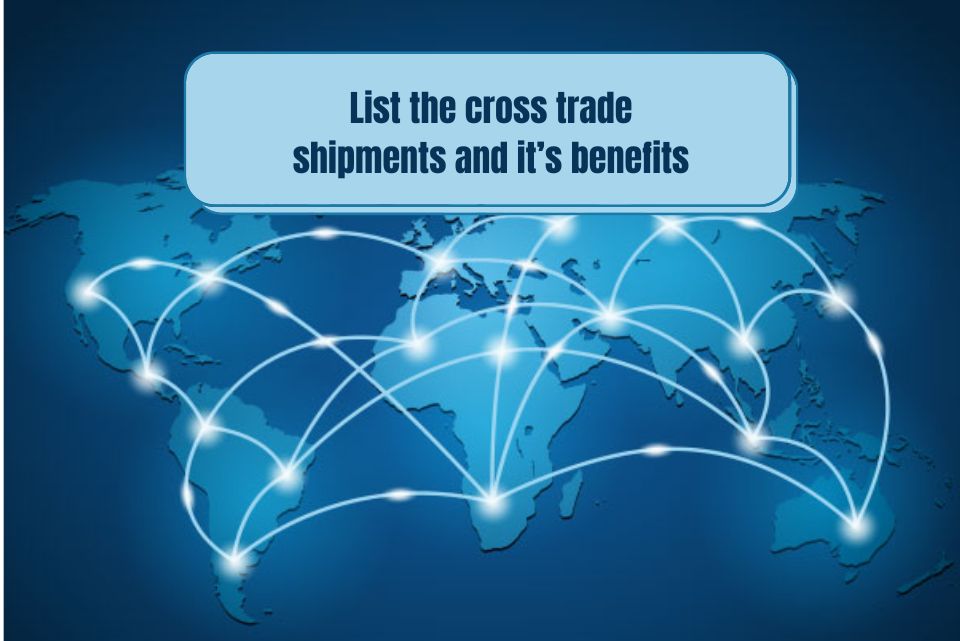The term “cross trade” refers to shipments organized between 2 countries where the seller lacks a local presence. Foreign-to-foreign shipments, third-party shipments, or – more commonly – triangle shipments are other names for them. There are several models to choose from when it comes to international shipments. The best option is determined by the products you’ll be shipping and the locations where your company does business. One such example, heavily influenced by globalization, is cross-trade shipments.
To manage the logistics are typically coordinated electronically with the assistance of specialist freight forwarding companies. Cargo shipped in this manner can be transported by road, air, or sea, depending on the closest exit point near the manufacturer/supplier and the entry point most comparable to the delivery location.
There are three types of cross-border shipments. The differences here are primarily determined by the country of origin of the manufacturer, shipper, and end customer. These three types are as follows:
Intra-community triangular operations – In this configuration, all countries involved are located within the European Union (EU).
Mixed Triangular (Extra-Community) Operations – In this configuration, the manufacturer or supplier is located outside the EU, but the shipper and end customer are.
Triangular (Extra-Community) Operations -In this case, neither the manufacturer nor the end customer is based in the EU, but the shipper is.
All the shipping types in this model have varying lead times for shipment. These can be identified and confirmed by the freight forwarding company where you invest time, and they will help you decide whether this is the right solution for you.
How do they help companies?
International trade rules and laws have allowed many businesses to operate outside their home countries. Triangular logistics provides these businesses the benefits they need to survive and thrive in international markets. Many companies opt for triangular operations for the following reasons:
Transportation times are shorter
Cross-trade shipping eliminates the need for a product shipped to the company’s home country and then forwarded to the customer. As a result, transportation times are reduced.
Lower-priced supply chain
The supply chain is one area where many costs can be reduced. Cross trades eliminate the need to bring goods into the seller’s country, which removes the freight, duty, and tax costs associated with the initial importation of the product. Working with a reputable freight forwarding company will save money on your supply chain by eliminating unnecessary shipping fees.
Gaining access to new markets
Cross-trades are an excellent way to enter a new market without incurring the additional expense of reselling your product from your home country after it has been imported.
Making use of a local forwarder
Rather than trying to find someone overseas to manage a cross-border trade for you, you can deal with a local forwarder in your time zone who will handle each country’s complexities while maintaining a single local contact.
Increased Competence
Cross-trade logistics decentralizes the supply chain because your goods can be manufactured in one location and delivered to another, regardless of your company’s site. This allows you to cater to buyers worldwide, giving you a competitive advantage over other businesses. You can look for buyers in your supplier’s country.
As cross-trade logistics occurs between countries other than your own, it is critical to thoroughly examine the trade agreement and rules between the supplier and buyer countries to ensure that all required documents and prerequisites are met. Choosing the right incoterms assists all parties in understanding and agreeing on their roles in freight forwarding, as well as highlighting the risks and costs of each party in order to keep disputes at bay.
An experienced freight forwarder has a global network of agents, a dedicated team, and a thorough understanding of trade guidelines, Incoterms, Bills of Lading, and other documents required in cross-border trade. They also help with insurance, packing, final delivery, clearance, and other paperwork, making cross-border trade easier for you.



